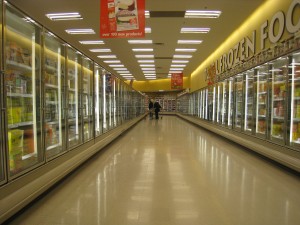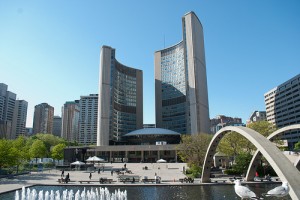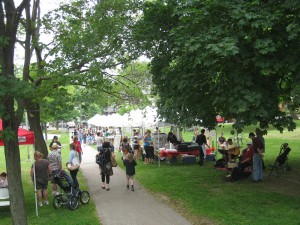Archive for June, 2011
I am tired of people complaining about the cost of food. I know, I sound like a terrible human being. Yes, prices are going up, and of course food has to be affordable. But we are pretty spoiled here in North America compared to the rest of the world when it comes to many things, and the price of food is no exception.
Take a minute to consider how much (or little) of our income that we actually spend on food compared to other nations:
• USA 9.6%
• UK 11%
• Japan 17%
• South Africa 27%
• India 53%
If you’re in North America, you’re spending less than 10% of your income on food. This figure used to be much higher. But believe it or not, it has been steadily decreasing over the past 90 years.
And now, after all this time, the landscape is changing.
The UN Food and Agriculture Organization (FAO), led by newly appointed Jose Graziano da Silva, says the increase is due to bad weather (droughts and floods in food producing areas), high demand, and a switch to higher protein diets. There was much talk about food shortages in 2009, and in February 2011, the FAO Food Price Index reached an all time high — this is a measure of the monthly change in international food commodity prices.
Mr. Graziona says prices are going to stay high — and volatile. And volatily, he says, is worse than high prices, because farmers are hesitant to invest in agriculture for fear of not making their return. Graziano partly blames this volatility on the “financialization” of key commodities by financial markets, i.e. speculation.
The price of food in Canada is rising, but we will not likely feel it until the end of the year, when according to the Globe & Mail — the rising cost of wheat, soy, corn, sugar and vegetable oil will have trickled down and be reflected in supermarket prices.
The UN points the finger for all this at the rising cost of crude oil. While it’s true the cost of wheat has doubled, the cost of wheat makes up only 15 cents of the price of a loaf of bread. The rest comes from processing, packaging, overhead and transportation.
Rising fuel prices are much more of a factor. 1L gasoline is up by 20% from last year, and the price of diesel, used by most transport trucks, is up 30% from last year. This will have a major trickle down effect on… well, everything.
So what can you do to minimize the strain? There are different ideas out there floating around. Start growing your own food during the warmer months to reduce food bills. Buy as local as you can to minimize the distance the food must travel. Buy food that has as little processing and refining as possible — to avoid the costs that each of these stages adds on.
One piece of advice was deceptively simple and made me laugh:
Use all the plant. Save the bones for soup. Freeze and can and jam and pickle the food you do have to stretch it as far as it will go — because the current lifestyle to which we have become accustomed may well be changing.
We’re pretty disappointed that members of the municipal government in our hometown, Toronto, are pushing to step away from their buy local food policy. It seems very shortsighted to curtail a policy that is good for the health of our citizens, good for the planet, and helps local food producers – simply to “get the biggest bang for our buck”.
If you’d like to send a message to City Hall on this issue, the good folks at Toronto Environmental Alliance have put a petition online you can sign by clicking here.
Get the real deal with certified local farmers’ markets.
Have you been to a MyMarket? After being told by those who know I that I had to check out a MyMarket, I took advantage of some free time today and cycled over to East Lynn Park’s Thursday afternoon market — a small but growing neighbourhood farmers’ market just a stone’s throw from Woodbine and the Danforth.
Like the other MyMarkets around Toronto, East Lynn is certified MyPick™, which means the farms have been verified as authentically local, and the items the farmer is selling truly come from his or her farm. I.E. you are buying direct. No middleman. No food depot. No farmy re-packaging of someone else’s produce. It’s what a farmers’ market should be.
Diana Gonzalez, Toronto District Supervisor for MyMarket, explained to me that MyMarket inspectors go so far as to check the farmers’ seed invoices, as well as crops in the ground or livestock being raised, to ensure everything is on the up and up. And on every market day, market managers check that the items each farmer is selling match up with activities back at the farm.
All very impressive, right? That’s a lot of legwork and effort and time to make sure that the dollars you devote to supporting local food truly support local food.
It’s great. It’s crazy. It’s wonderful. I’m dizzy. So why aren’t we all shopping there?
Chatting with some of the farmers, I learned that shopper turn out can sometimes be quite poor – something they couldn’t understand because of “all houses all around us!” East Lynn is a relatively new market. If the neighbourhood wants to have continued access to fresh strawberries, sweet peas, wildflower honey, maple syrup and lamb chops, not to mention all the other baked treats I saw, it’s time to step up and show your support!
If we don’t support the local markets, our local farmers won’t bother coming in to see us, and we’ll be forced to shop for depot food at the supermarket.
C’mon out folks. It was a late spring, but it’s all coming up roses now!
In a follow-up article, the Toronto Star reports that the food service company that once fed 75 day-care and Montessori schools supposed organic, kosher and halal meals has shut its doors.
It’s all very mysterious.
Whole Green Kids somehow managed to pull a fast one on schools and parents of children with allergies, and who follow faith-based food preparation traditions.
The provider of so-called ‘premium’ meals has apparently been moving shop over the past few months to avoid paying kitchen rent. Meanwhile the owner, Susan Blouin, lives in a $2 million home and drives a Porsche. Really? I mean really??
It’s actually all very disturbing.
I have a lot of faith in the good food movement. I pay extra for organic. I eat local. I push the ideal and do my best to convert friends. I also occasionally work in catering, and have great respect for reputable companies like Sublime Catering and Real Food for Real Kids.
And I think there is great potential for more good food to be available in our everyday, non-elite lives – because the general population is becoming more food-literate, consumers more savvy, and deadly e-coli outbreaks remind us we have to be vigilant about the quality of our food.
But this company is casting a dark cloud on my parade. And it pisses me off.
If you’re concerned about the quality of food being provided to your children, I encourage you to check out the claims made by the food service or catering company you use. Don’t assume they’re pulling a fast on you; as I see it, Whole Green Kids is the exception, not the rule. But you have every right to feel comfortable about the food someone else is selling you.
Last night, a friend sent me a Toronto Star article about the downward spiral of Whole Green Kids, an Ontario catering company that specializes in preparing organic, kosher and halal meals for children.
If the allegations are true, and this company has been passing off discount supermarket fare as homemade, wholesome and prepared according to religious traditions, it is a sad day for catering companies.
All the more reason to value the good ones that are out there!


